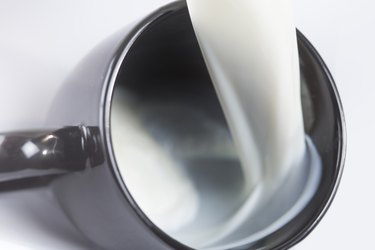
Whey is a liquid by-product made during the production of dairy products such as cheese. Fitness companies use whey as an ingredient in muscle-building formulas because of its high-quality protein. Research has demonstrated that a well-timed protein supplement following a workout can enhance muscle growth. You can take whey as a liquid or solid. Liquid whey has several other nutritional benefits beyond protein.
Calories
Video of the Day
A 1-cup serving of liquid whey, weighing 246 g, contains 66 calories. Calories provide an indication of the energy value of a particular food. According to the USDA, highly active adults between the ages of 19 and 30 generally need about 2,400 to 3,000 calories each day. A 1-cup serving of liquid whey contributes about 2 percent of the typical active adult's daily caloric needs.
Video of the Day
Protein
A 1-cup serving of liquid whey provides 2.09 g of protein. Protein should account for 10 to 35 percent of your total calories, so if you consume about 2,800 calories a day, you'd need about 280 to 980 calories, or 70 to 245 g, from protein each day. Whey is a high-quality protein, containing all nine essential amino acids.
Fat
A 1-cup serving of liquid whey contains 0.89 g of fat. Active adults need about 840 calories, or 93 g, of fat each day to support their energy needs and protect organs, transport and store vitamins and regulate hormone production. More than half the fat in liquid whey is saturated -- an unhealthy fat that can increase blood cholesterol and increase the risk of cardiovascular disease. The majority of your fat intake should be unsaturated, while saturated fat should account for less than 7 percent of your total caloric intake, according to the American Heart Association.
Carbohydrates
Liquid whey is naturally high in carbohydrates with about 13 g per 1-cup serving. All 13 g of the carbohydrates in liquid whey exist in the form of simple sugars. Active adults need about 1,260 to 1,820 calories, or 315 to 455 g, from carbohydrates each day. Less than 25 percent of your total calories -- about 700 calories for active adults -- should come from simple sugars, according to the Institute of Medicine.
Vitamins and Minerals
Liquid whey is rich in quite a few vitamins and minerals. Each 1-cup serving of liquid whey contains vitamin C, B-vitamins and vitamin E. Liquid whey also contains the minerals calcium, iron, magnesium, phosphorous, potassium, zinc, copper, manganese and selenium. A 1-cup serving of liquid whey contains 133 mg of sodium. The USDA recommends that adults consume less than 2,300 mg of sodium each day to reduce the risk of high blood pressure and cardiovascular disease.
- U.S. Department of Agriculture: Dietary Guidelines for Americans; 2010
- Institute of Medicine; Dietary Reference Intakes; Macronutrients; 2005
- American Heart Association; Saturated Fats; October 2010
- USDA National Nutrient Database for Standard Reference; Whey, Sweet, Fluid
- Centers for Disease Control and Prevention: Vitamins and Minerals
- MedlinePlus: Protein